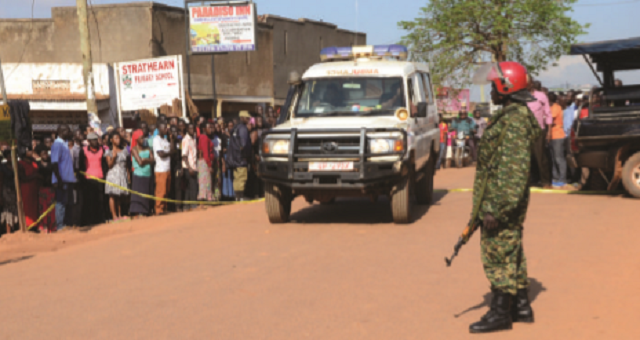
On December 28, 2014, Sheik Bahiga Mustafa was shot dead in his car outside a mosque along Entebbe Road. He too was with his children. Sheik Mustafa was killed just three days after another prominent Muslim, Sheik Abdul Qadir Muwaya was killed by gunmen in Mayuge on Christmas day. He was the leader of the Shia Muslim Community in Uganda. Before that, on April 20, 2012, another to Muslim; Sheikh Abdu Karim Ssentamu had been shot at in Kampala.
Two months later, in June, another Muslim cleric, Abasi Abubaker Kiweewa, was shot dead at his supermarket in Kyanja, a Kampala suburb. Again two months later, two other prominent Muslims Yunusu Madungu and Muhammad Maganda, were gunned down on Eid el-Fitr in Bugiri district.
The latest case puts government and specifically police on the spot because by striking successfully again, the assailants are proving that they have capacity to snatch any target under police watch, critics say.
Indeed, incensed by the murder, Muslim clerics like Sheikh Muzata are already calling for radical solutions saying that measures instituted by police have not helped the situation. Police is calling for calm.
But observers warn that such calls might fall on deaf ears if the enemy keeps striking despite police’s efforts. At the heart of these murders are fights between different sects of Islam, whose members including Kiggundu have previously belonged to the ADF and other rebel groups.
Kigundu has history with the ADF. After studying at Muslim schools– Bilal Primary School found in Bwaise and later Bilal Islamic Secondary School, Kiggundu became a Sheikh. He previously led prayers and taught Madrasa sessions.
Kiggundu, at the time of his murder belonged to the Tabliq sect of Islam, which he is said to have joined in the late 1980s. The sect had its base at the William Street Mosque in Kampala. Sheikh Yunus Kamoga, who is among the sheikhs facing the charges was the group’s leader.
In 1991 Kiggundu, Kamoga and others were accused of perpetrating an attack on Old Kampala Mosque in which four policemen were killed and they fled the country.
Following the incident, Kiggundu fled to exile and joined a rebel group linked to ADF. Kiggundu later applied for amnesty, returned to Uganda and joined the Chieftance of Military Intelligence (CMI) and was until his death considered the security forces’ link to Muslim factions.
Maj Kiggundu is said to have worked closely with Sheikh Hassan Ibrahim Kirya, who was also shot dead last year in similar fashion.
Maj Kiggundu was under the Tabliq sect led by Dr Haruna Jjemba, which broke away from the mainstream Tabliq sect headed by Sheikh Kamoga.
****
editor@independent.co.ug
 The Independent Uganda: You get the Truth we Pay the Price
The Independent Uganda: You get the Truth we Pay the Price


